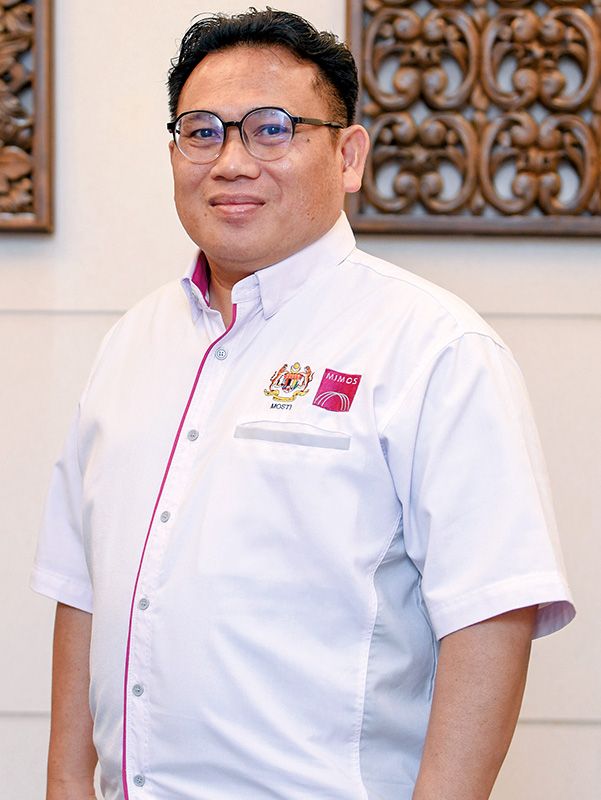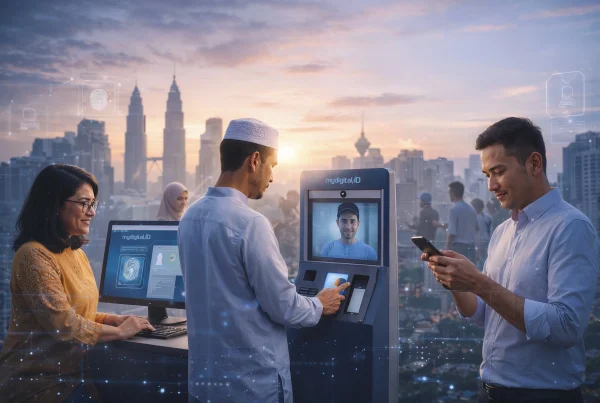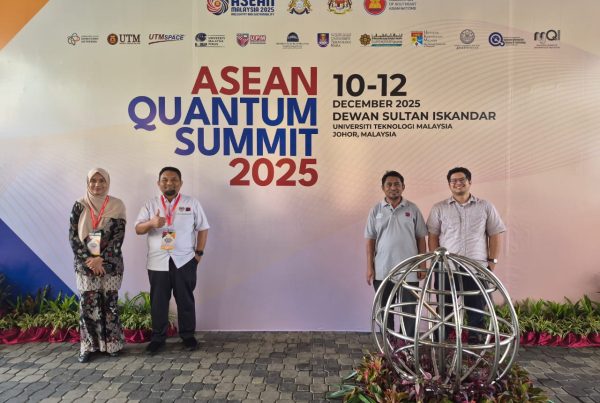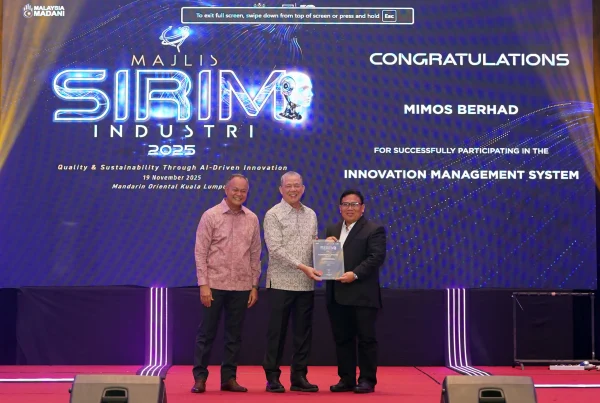AI, a major technological breakthrough that has become ubiquitous in the lives of people around the world, requires robust computing infrastructure and high-performance data storage to function effectively.
“Everything we do and touch today is very much associated with AI. In order for AI to function, you need computing power, especially when you talk about the large language models and data analytics,” says Shukri, who adds that AI and quantum computing are complementary technologies.
MIMOS believes that quantum intelligence, which is a convergence of quantum computing, AI and advanced algorithms, will be crucial in accelerating deep tech domains such as AI, blockchain, supercomputing and semiconductor innovation, he says.
“For Malaysia, this isn’t just about adopting the next big thing; it’s about leapfrogging into the forefront of global deep tech. As we accelerate our digital economy and aim to be a regional tech hub, quantum intelligence will be pivotal in areas like national logistics, cybersecurity, finance, healthcare and climate modelling,” he adds.
For instance, AI becomes significantly more advanced when developed and deployed on quantum processors, which allows models to process data faster and more efficiently, says Shukri. Additionally, blockchain systems can be fortified using quantum encryption, which creates networks that are resilient even against the most sophisticated cyber threats.
The integration of quantum co-processors will also increase the capabilities of supercomputers in terms of processing speed and complexity. Moreover, quantum models enable simulation and design at atomic precision for semiconductors.
This is why quantum intelligence will be able to redefine problem-solving across industries, says Shukri. He says this includes drug discovery, enhancing climate forecasting, optimising financial systems and building the backbone of future smart cities.
“Why now? Because quantum tech is reaching maturity and those who act today will shape the global power balance tomorrow. We believe Malaysia has the vision, willpower and infrastructure to be among those leaders,” says Shukri.
On its part, MIMOS will act as a “conductor” to unify all efforts in quantum intelligence with a shared vision and direction to ensure faster progress, says Shukri. For example, MIMOS has formed a dedicated department and is establishing a quantum intelligence centre to facilitate collaboration among universities and other stakeholders, recognising the significant investment required.
To start off, MIMOS has launched the Quantum Intelligence Centre that will serve as Malaysia’s first national facility and platform for applied quantum R&D. The centre will also serve as a talent development hub and industry collaboration facilitator.
MIMOS’ broader strategy includes establishing the Malaysian Quantum Valley, National Quantum Hub and Satellite Labs. The Malaysian Quantum Valley will be a high-tech innovation zone fostering testbeds for quantum applications, offering incentives for investors and start-ups and providing collaborative structures between academia, industry and government.
Meanwhile, the National Quantum Hub will focus on pillars such as quantum infrastructure and ecosystem; talent development and upskilling; and regulatory and ethical frameworks.
“We’re not just studying quantum but also building Malaysia’s quantum intelligence ecosystem. Our mission is not only to lead but also position Malaysia as a regional hub for quantum diplomacy, innovation and industry partnerships,” explains Shukri.
Ultimately, MIMOS aims to enhance the security and reliability of Malaysia’s digital infrastructure, reducing online fraud and ensuring the nation’s sovereignty in the digital economy.
The immediate focus is on “low-hanging fruits” such as enhancing communication security and leveraging products and technologies for business opportunities within the local industry, says Shukri. A key priority is establishing a lab that supports the end-to-end development, application and use cases of quantum technology for various sectors.

“Why now? Because quantum tech is reaching maturity and those who act today will shape the global power balance tomorrow. We believe Malaysia has the vision, willpower and infrastructure to be among those leader.”
Dr Saat Shukri Embong,MIMOS acting president and group CEO
HAVING A QUANTUM JUMP-START
MIMOS already had its fingers in quantum technology as it had been investing in quantum-related research since the 9th Malaysia plan, says Shukri. The agency has filed over 37 patents in the field of quantum.
Established in 1985, MIMOS initially focused on microelectronics research, which laid the groundwork for the country’s early foray into semiconductor technology. MIMOS began its foray into quantum technology with quantum communication, which is used to securely transmit information, by building on its strengths in photonics and Malaysia’s existing fibre-optic infrastructure.
“Quantum intelligence now represents our next frontier. As we look towards the next 40 years, MIMOS will drive Malaysia’s quantum future, just as we did with microelectronics and the internet era. We are evolving into a national powerhouse for deep strategic tech and quantum intelligence is the keystone of that transformation,” says Shukri.
This is especially important as other countries have also had a head start in the technology. For instance, China and the European Union (EU) are investing billions of dollars in quantum computing.
China has committed US$15.3 billion in public funds to quantum computing investments, according to news reports. On the other hand, the EU has launched the Quantum Flagship, a large-scale initiative with a budget of €1 billion over 10 years, according to its info booklet.
Closer to home, Singapore leads in quantum R&D with investments exceeding S$300 million through its National Quantum Strategy.
With this, MIMOS’ priorities are threefold, notes Shukri. For one, the agency will focus on industrial adoption and collaborate with sectors like healthcare, logistics and finance to develop quantum-powered solutions. Quantum education will also be embedded into universities and vocational institutions, developing certification tracks and mobility programmes.
Strategic collaborations will also be made through partnerships with governments, academia and global industry players, Shukri says. For example, MIMOS has signed a teaming agreement with SDT Inc, a South Korean company specialising in quantum standard technology, to establish Malaysia’s Quantum Valley and to develop quantum secure communications.
To add to this, MIMOS will support Mosti’s initiative to stimulate the growth of the quantum industry in both the public and private sectors. The agency will also advocate for Mosti to advance research, development, commercialisation and innovation in quantum technology.
“Malaysia’s strengths lie in our nimble policymaking, strategic location and growing tech infrastructure. Gaps remain in high-end manufacturing and quantum-trained talent, which are areas we are addressing with policy, partnerships and platforms like the Quantum Intelligence Centre,” explains Shukri.
“Our secret weapon is our ability to integrate, leveraging quantum with AI, cybersecurity and semiconductors. We see leadership potential in secure communications and AI-powered simulations for logistics and drug discovery.”
To lay a foundation for a coordinated quantum strategy, MIMOS is also driving the National Quantum Policy 2026-2035, which will cover R&D, talent, regulation and international engagement, says Shukri. Early milestones include the quantum intelligence centre launch, talent pipelines by 2026 and operational testbeds and sandboxes by 2027.
In the long run, Shukri believes that quantum intelligence will catalyse high-value job creation in the fields of quantum engineering, spur industrial innovation across sectors and attract foreign investment by positioning Malaysia as the Asean “epicentre of quantum”.
“Being a quantum-enabled nation means possessing the strategic capability to solve complex problems faster with greater precision and security. It’s about redefining innovation, strengthening digital sovereignty and unlocking homegrown breakthroughs,” says Shukri.
“More importantly, it strengthens digital sovereignty by reducing our dependency on foreign IP and systems. By building indigenous capabilities, we ensure national resilience and open doors to breakthrough innovation.”




